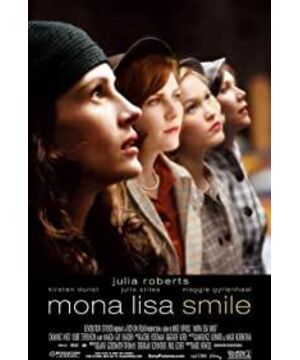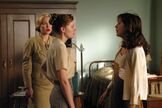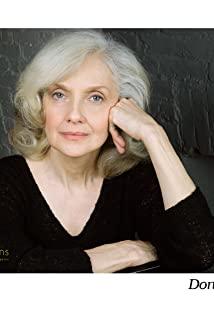This movie, which was released in 2003, should be regarded as a movie that had a feminist enlightenment influence on me. I can't remember how many times I have watched this movie, but with the growth of age and experience, every refresh will bring new ones. knowledge and understanding.
"Mona Lisa's Smile" is mainly about a talented art history teacher Katherine Ann Watson (played by Julia Roberts), a talented and avant-garde female independent thinking, at Wesleyan, a famous girls' school in Massachusetts, USA. The story of teaching at Wellesley College. The plot design of the film is compact, the pictures are exquisite, and the details and portrayals of different characters are also in place. The music sets in the play are quite American in the 1950s, and every woman in the play has a distinct personality, real and full. .
Wesleyan College, a prestigious women's higher education college in the United States (yes, the American university where the three Song sisters once attended), is known as the "Ivy League University" for women. The students here are very intelligent, and most of them come from wealthy families and receive an elite education since childhood. The female students trained by this women's college can be said to represent the most advanced thinking and self-cultivation female image in the United States at that time. When Katherine came to Wesleyan's first class, she was challenged by these brilliant female students, and the story began.
main story
In the fall of 1953, Katherine came to Wesleyan College as a newly hired teacher in the Art History Department. The film's storyline is simple and smooth, and Betty's three editorials after Katherine's arrival can be used as a dark thread to intersperse the conflict and climax of the entire film.
1. The condom scandal
Betty's first editorial slammed the school doctor, Amanda, for providing contraceptives to students. Because the Betty family's influence on the college board of directors should not be underestimated, and Amanda's consistent radical style runs counter to the school's orthodox conservative style, In the end, Amanda was fired by the school. The use of contraceptives is itself a protection for women, and at that time, everyone's attitude towards sex was still conservative, and mainstream social values were very secretive about premarital sex. The whole incident seems so absurd to us now. As Amanda accused in the film, everyone didn't even think about who was protecting the safety of women, who was the one who really needed to be protected, and everyone What is it that you are struggling to maintain. This result made Katherine sympathize with Amanda very much, and also realized the shackles behind this strict school. These shackles include the oppression of power, the imprisonment of women's sexual freedom from the patriarchal system, the constraints of religious culture, and even the brainwashing of women's own chastity.
2. What roles are women born with?
From the first day Katherine walked into Wellesley College, the avant-garde female teacher seemed to have been reminding this group of talented girls that their future life should not be based on marriage. Her own life trajectory clearly adheres to her definition of self-worth. She is unmarried and has not planned marriage as a necessary option in her life. For Joan's idea of going to Yale to study law after graduation, Katherine is very supportive and firmly encourages Joan to have both academic (career) and family (marriage) when she hesitates. It can be seen from Katherine's many conversations with Joan that she does not think it is wise for women to give up their dreams and careers in order to get married, and it is clear that for herself, she ranks these two before marriage. And Betty's wave of operations stood on the opposite side of Katherine. Betty held a wedding in the middle of the semester and skipped school many times on the grounds of marriage. Because of her family's prestige and society's high expectations for women to marry and have children, this behavior was acquiesced by the college. However, this approach is bizarre for Katherine, who is facing criticism for Betty's absenteeism, and said that if Betty continued to neglect her studies, she would not pass the assessment of the course. Obviously, Betty, who was accustomed to the preferential treatment of other courses, was very dissatisfied with this resolute female teacher. On the other hand, Betty is extremely disgusted with Katherine's repeated persuasion of Joan to go to law school for further study. She believes that such teachers are misleading their children and delaying Joan's happiness in marriage. So Betty wrote in a second editorial that Katherine's radical behavior was a declaration of war on marriage, and an invitation to girls to give up their "birth-given" (reproductive) mission.
3. A fresh perspective
Betty's married life is not as good as she imagined. From the joy of the newlyweds to the troubled after marriage, Betty quickly realizes that this is not the marriage she wants. From her husband's long-term overtime excuses for not going home at night and his detachment when getting along, to finally finding out that her husband was having an affair outside, what Betty felt was the despair of marriage. The marriage didn't last long before Betty filed for divorce. At this time, Betty, who returned to the classroom, suddenly understood Katherine's good intentions. Betty regained the atmosphere of free pursuit of knowledge in Katherine's classroom, where she saw the focus of the girls' eyes and the light of their thoughts again, and this state is so beautiful. The light in the eyes of girls is not obtained by marriage, but by the desire and pursuit of knowledge. As Katherine wrote to Betty before her departure, to change for others is to lie to yourself. Women should not choose to give up themselves because of the so-called secular treaty become an accessory to marriage. Women should have enough freedom to choose what they want to do and to pursue the values they want in life, whether in career, academics, or family. Betty wrote in her final editorial that Katherine is an extraordinary woman who brings a new perspective to the world, truly transcends tradition and pursues the truth, and the example she sets is worthy of all of us admire.
The story ended in the picture of the students saying goodbye to Katherine, who was about to embark on a coaching journey in Europe. The students rode bicycles and reluctantly followed Katherine's taxi and said goodbye. Tears soaked Katherine's eyes. I think Katherine should be very gratified in her heart. She has fulfilled her original intention of coming to Wellesley, breaking the traditional barriers and opening up a more free and independent outlook on life for girls.
Katherine Character Analysis
Advanced people and things were not accepted in her era, and were even considered unreasonable. Katherine's every move and her maverick style are so out of tune with the social environment at that time that even in today's domestic social environment, it is hardly understandable by ordinary people.
The background of Katherine's life is very interesting. In the United States in the 1950s, the economy recovered after the war, and the material level was greatly improved. Before that, with the development of technology and the needs of war, a large number of women began to pour into different fields of work. You must know that before World War I, women basically had no qualifications for work and the right to vote. After World War II, women not only liberated their hands, but also greatly liberated their minds. After that, in the 1970s, the United States ushered in the peak of the feminist movement. The improvement of living standards and social progress provided nutrients for the growth of feminist ideas, and more and more women began to express their voices in different fields. . Interestingly, this female film released in the United States in 2003 was directed by the male director Mike Newell. The director who once directed the Harry Potter films is also quite artistic in the performance of feminism in the film, and vividly portrays the independent personality and charisma of the female character Katherine.
The role of Katherine in the 1950s was brave, avant-garde, and even subversive. But from today's point of view, her words and deeds are just sticking to her own heart. If the filter of gender is not included, this is an extremely simple and natural thing for an independent individual. But it is such a small change in the way of thinking that for women all over the world, it is a huge change in history. An astonishing fact is that it was not until the World Conference on Women in 1995 that UNESCO recognized for the first time that "feminism is part of human rights", in other words, it was not until 1995 that women were recognized worldwide as having Independent "people". On the other hand, women's rights to education, voting, reproductive rights, and even abortion rights have only been seriously scrutinized since the last century. The charm of Katherine's character setting lies in her pioneering nature. She uses her actions to prove the diversity of women's lives, so that more women realize their potential and the right to choose freely.
a few supporting roles
There is no doubt that Betty is the most personal and most important of all the supporting characters. Betty in the play represents the mainstream values at that time: the excellence of women lies not only in education but also in marriage and family. Betty 's sharp personality also makes her stand on the opposite side of non-mainstream things many times throughout the film: she scoffs at Giselle 's close relationship with the male teacher William , dating a married man, etc. Her love life was once full of contempt and even misleading. She evaluated Katherine as a 30-year-old unmarried woman. She protested the school doctor's privately distributing condoms to female students...
It can be said that Betty is a product of male domination, and such a role setting also laid a tragic foreshadowing of her marriage from the very beginning. In the first half of the film, Betty is like a "spokesperson" of patriarchal justice. She is proud of her origin, family, and marriage, but in the end she finds that she is just a victim of family interests and marriage contracts. The grand wedding and exquisite appearance turned out to be nothing but an empty shell under the package of the game of family power and vested interests. It is quite ironic that Betty , who was alone in the empty bed all day, was reprimanded by her mother to go back to her "own home" after returning to her parents' house. Her mother's comfort to Betty after she found out that her husband cheated was that she had communicated with the parents of the husband. After that, they won't get divorced, the family ugliness can't be made public, it's fine to adjust a period... So Betty 's marriage is sad, but it was typical at the time, and women, as the first subject of marriage, were regarded as the first subject of marriage from beginning to end. An object is at the mercy of family, parents, husband and even public opinion.
As Betty 's best friend, Joan also plays an important role in the play. Compared to Betty , Joan is lucky. She has a partner who truly appreciates each other. From the perspective of the play, her academic family is in line with her inner thoughts and goes well. She has her own aspirations and a mentor who can help her. , the decisions she made basically followed her original intention. Although Joan still chose to give up studying for a master of law for the sake of his family, which is a bit of a pity to everyone, but perhaps it was an intentional arrangement by the screenwriter. Here is an open answer to how women should choose career and family, because no one can give The standard answer is, you only live once, and it is worthwhile to choose to follow your heart at the moment.
Giselle is a very interesting character in the movie. Compared with Katherine's maverick, Giselle is more like a rebellious child who wants to leave the patriarchal society. We will not comment on some of her extraordinary emotional operations. From the film, we can know that Giselle was born in a Jewish family, and her parents divorced after the war. No matter in terms of ethnicity or family status, in the environment at that time All belong to "that small part" of society. It may be that she has experienced the fragility of marriage and the broken family prematurely. Giselle reveals doubts about the relationship between men and women, but also has a potential Electra complex. Giselle is emotionally precocious, she ventures into premarital sex, she likes to hang out with men older than her, and she scoffs at Nancy 's so-called "female virtue" lessons. This character makes the whole movie more three-dimensional and full. It seems weird but there is no lack of rationality in it. It seems crazy but very real.
The role of Coney reminds me of most ordinary girls in life who inevitably carry a little inferiority in a society dominated by the male gaze. But I like this character, because she never feels sorry for herself, she is not shy about looking forward to and striving for beautiful things, and finally relied on her own talent and courageous pursuit of love to gain her own happiness. She is a seemingly ordinary character written by the screenwriter. But the characters are full of tension, just like Coney playing the cello intoxicated in the play. As for the landlady Nancy and the school doctor Amanda in the film, they may not be so lucky. The former lived alone for most of his life because his "beloved" was killed in the war, but in the end, he dramatically discovered that it was just a lie from the other party. ; The latter and his partner spent most of their lives with each other in school, but were criticized by others because of their unusual marriage and love patterns, and were eventually expelled from the school for some of their "subversive" behaviors. The design of Nancy 's character may be used as an irony by the writers. She is very like those women who have been brainwashed by love and finally deeply poisoned. Compared with Nancy , the screenwriter designed a brave and sober woman like Amanda , but unfortunately the era is different, the judgment of history and the fate of the protagonist have become different, Amanda has not been recognized by society because of her independence and kindness .
some interesting details
At the beginning of the film, the school director asks Katherine if she has been to Europe before because of her unique insights into European art. Katherine is very honest in saying that she has never been to Europe, meaning that her personal analysis and insights come from readings and literature, honestly and directly. In sharp contrast, in order to pursue Katherine, the Italian male teacher lied that he had participated in the war in Europe and portrayed himself as a heroic "war hero". It was not until Katherine chatted with one of his old friends that he found out that he had fought in the war in Europe. Professor Dumba has never actually been to Europe. Such a small oolong plot is a unique and interesting satirical design by the screenwriter; in order to please the woman they want, men can often brazenly exaggerate the facts or even lie. After being caught by Katherine, Professor Dumba can actually use "You're so perfect - it's impossible to be honest with you" to excuse himself. Such an example is also intriguing in the workplace. Men can always confidently exaggerate their abilities and have greater ambitions and aggressive attitudes towards the positions they aspire to, while women tend to conservatively estimate their abilities .
The "female morality" class for girls in the film seems ridiculous, but it actually reflects the definition of women's roles in society at that time. No matter how educated women are, they are still expected by society to be an image of their husbands, just like how to win the appreciation of their husbands for their husbands in the class, and so on, women will inevitably be persuaded to receive higher education. Embark on the path of being a husband and a child.
There are many small details about the characteristics of Katherine's characters in the play, and she is comfortable with herself. For example, when Katherine's boyfriend came to see her from California, the landlord Nancy asked whether Katherine should tidy up the messy room, and her boyfriend humorously answered "This lifetime? It never happens!", which is really cute and doting, indicating that her boyfriend is rude to Katherine already used to it. Another example is that Professor Dumba told Katherine in the tavern that if he was K's boyfriend, he would not let her go to the northeast alone to teach, and Katherine was just a counterattack - if he was his boyfriend, she would not be here. Seeking his permission in the matter, directly hitting Dumba in the face hurts. Perhaps Kathrine's charm lies in her being so natural and sober, knowing that she can make the choices she wants to make, rather than being constrained by a certain man or gender.
The brokenness of Nancy's beautiful "love story" is also a very interesting plot design. For the so-called perfect love and heroic hero in her heart, a woman has waited hard for most of her life and has never been married, but unexpectedly met her "deceased" lover at a cocktail party, and learned that the other party had already married, how ironic it is story. It's like the stories of those sluts you've heard or encountered, and men's love is often not as firm as women think, and even the final break-up routine has the same effect - in order to play and disappear, you can pretend to sacrifice on the battlefield , cut off correspondence.
On the topic of art in film. In a certain class in the film, Katherine introduced Van Gogh's paintings to the students, and one of the female students inadvertently revealed that she had a collection of authentic works of her deity in her home, which could be regarded as a ruthless Versailles. This detail also reflects the favorable family background of the girls' school students from the side. In another practical class, Katherine took the students to watch the paintings of American modern artist Jackson Pollock, which is also very clever. Because Jackson Pollock created the world-famous "Drip Painting", which is itself a very pioneering figure in the history of modern American art. His drip paintings became the epitome of unrestrained American character and a classic of Abstract Expressionism. In the field of art, Pollock is an iconoclastic figure, just like the many rebellious female characters portrayed in the film, which is very intriguing. As for why the title of the film is called "Mona Lisa's Smile", my personal understanding is that the beauty of women is like Mona Lisa's smile, beautiful and mysterious, and should not be defined, nor should it only stay on the surface , only those things that are deeper and more core can complement the beauty of women, rich and profound.
I've seen this, if you like my text, please follow my Weibo~~ Xiqing Siena doesn't love celery, hee hee~
View more about Mona Lisa Smile reviews











